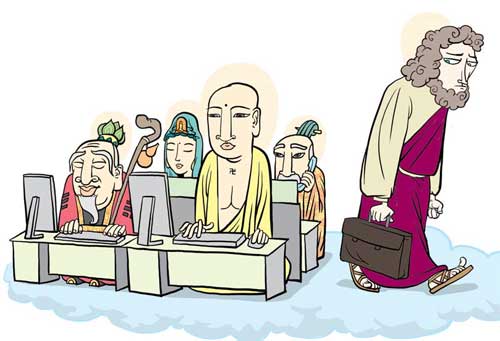Honey, who moved my position? Guess who?
Updated: 2011-06-24 10:53
By Sarah Jones (China Daily European Weekly)
It is no longer an easy and comfortable ride for expatriates in China's talent shopping market
 |
Well to be honest when I first read the subject line that my PR executive wanted me to address I knew that on publication my entire office here would look at me in a completely different light I asked her: "Any chance we can keep this article quiet?"
So here I am, manager of global human capital consultancy Antal International. English, privately educated, relatively well traveled, tenured within my company, and an expat surrounded by Chinese.
Chinese are stronger? What's my position?
Well let's have a look at why I'm even being posed this type of question, and why such topics especially in "my world" of international business have become so important.
It was only a couple of decades ago that China opened its doors to the rest of the world; since then, this great country has catapulted into the stratosphere - its economy has taken off like the fireworks of a Chinese New Year's celebration, lighting the sky for days on end.
International companies began to infiltrate China, my own included at a very early stage. UK-based Antal International launched the Beijing office in 1993. I still wonder where my chairman gets his "crystal-ball" like ideas.
However at that time the Chinese were not the most forward thinking people; risk averse, and not willing to proffer an opinion, even those in big cities such as Beijing and Shanghai, hardly surprising either looking at this country's history - think I would have been mute too. Talk about not knowing what's around the corner, no one here could have been ready for the culture shock, for the spotlight to be so firmly focused on this country for so many reasons in such a short amount of time.
The influx of international companies brought homegrown employees from their own countries for language convenience and to promote a common culture. Only people with excellent language skills and the capability to adapt to different cultures were accepted in.
At this same time, Western countries had such a highly developed image in China, imported goods from the West were developed, they provided more variety, such products were new, so different - exciting even. The Chinese were probably nervous but curious too, taking everything in blindly, they somehow began to worship almost everything foreign imported.
It is very true to say that back then foreigners here were considered knowledgeable, experienced and far better than locals. Companies were proud to have expats seated in Chinese offices, as if their presence alone brought the firm to a whole new level. Until now, the older generations still want their children to get in to foreign companies, considering the work to be more decent and well-paid and superior than local companies.
To paraphrase - a decade or two ago in China, companies would choose expats over local people in a heartbeat - no competition whatsoever, none.
However, things change.
A colleague of mine, who moved to Beijing in 1998 for several years, lived like a king. He worked for a well-known UK company, had a four bedroom apartment (even though he lived alone), had a company car with a driver, return plane tickets - business class; cleaner, cook, well just about every perk under the sun. He was also provided with a generous hardship fund, (calculated on the number of miles away he was from his homeland) for being away from his family. This is very different to the situation most expats coming to China find themselves in 2011.
Out at dinner last week I posed some questions to some newly arrived expat colleagues of varying nationalities from Europe and the US. These days the reality is reasonable budgets are covered for apartments, but the benefits are greatly reduced now that the talent pool of locals here in China has increased. When I was asked to move out here last year by the group-managing director for Antal, he said: "Sarah, don't expect a hardship fund, there's no hardship about being in Shanghai. In fact most of the people in the London office would love to be in your situation." He wasn't wrong.
Indeed, the Chinese economy now is flying and its potential has been acknowledged by the whole world. This country is simply the No 1 place to be, that's why I am here, and that's probably why you are here. People want to come to China to work. Each week I receive about 30 emails from candidates overseas hoping for their big break into China, I even get emails from students asking if they can work here as interns knowing that the China experience can increase their future chances of career advancement.
However, it is not as easy and comfortable as it used to be for an expat, as we see this enviable country develop. Education is rapidly improving and producing young and talented Chinese, no doubt in my mind the "leaders of tomorrow". I have witnessed firsthand the shift in mindset of multinational HR departments here in Shanghai. This was highlighted at a client meeting last week with the human resources director of a leading pharmaceutical company. With a veritable war for talent, the company stressed that they would be more than happy to hire locals with excellent English, and only at a considerably lesser package if they didn't have international exposure.
There are far less difficulties in communicating with foreign businesses and the cultural differences than 20 years ago. Exposure to Western ways has understandably enabled the locals to have a far wider view.
These days would companies, would HR, choose locals over expats? Are the Chinese becoming stronger? Increasingly yes:
A CEO of an international consultancy says that, "it is not easy coming to China to work anymore. One of the reasons is that China has trained local talents through both domestic and overseas business institutions." He feels that transnational enterprises would begin to gradually stop recruiting foreigners to come to China. "People who want to come here should be prepared for Chinese culture and especially Chinese language."
When asked about foreign staff, a local HR manager told me: "Now local people with excellent language skills are available and I'd rather choose them over foreigners. Sometimes between locals and foreigners there are cultural differences that can cause serious problems and I just don't want to deal with that anymore".
I believe that the Chinese are becoming stronger, but there's still a long way to go until the top level positions of international firms are held by locals. I have no doubt that in colleges here today we will find them seated; kids that by the time they graduate will understand their own culture, will have been influenced by our Western ways from a young age, and will speak fluent Mandarin and English, and probably a plethora of other languages. I just hope I am one of the first to hire them, that's what all good managers do, isn't it, hire those better than you?
The author is manager of Antal International, China.
E-paper

Shining through
Chinese fireworks overcome cloudy times, pin hopes on burgeoning domestic demand
Pen mightier than the sword
Stroke of luck
Romance by the sea
Specials

90th anniversary of the CPC
The Party has been leading the country and people to prosperity.

My China story
Foreign readers are invited to share your China stories.

Green makeover
Cleanup of Xi'an wasteland pays off for ancient city
